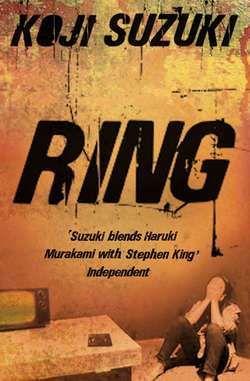Читать книгу Ring - Koji Suzuki - Страница 9
4
ОглавлениеAsakawa hung up the phone and stayed there like that for a while, motionless, his hand still on the receiver. The sound of his own unnecessarily excited voice, hanging on the other person’s reaction, still echoed in his ears. He had a feeling he wasn’t going to be able to do this. The person on the other end had taken the phone from his secretary with a suitably pompous tone, but as he’d listened to Asakawa’s proposal the tone of his voice had softened somewhat. At first he’d probably thought Asakawa was calling about advertising. Then he’d done some quick calculating and realized the potential profit in having an article written profiling him.
The “Top Interview” series had begun running in September. The idea was to spotlight a CEO who had built up his company on his own, focusing on the obstacles he’d overcome and how. Considering that he’d actually succeeded in getting an appointment to do the interview, Asakawa should have been able to hang up the phone with a little more satisfaction. But something weighed on him. All he’d hear from this philistine were the same old corporate war stories, boasts about what a genius he was, how he’d seized his opportunities and clawed his way to the top … If Asakawa didn’t thank him and stand up to leave, the tales of valor would go on forever. He was sick of it. He detested whoever had come up with this project. He knew, all too well, that the magazine had to sell ad space to survive, and that this kind of article laid the necessary groundwork for that. But Asakawa himself didn’t much care if the company made money or lost it. All that mattered to him was whether or not the work was engaging. No matter how easy a job was physically, if it didn’t involve any imagination, it usually ended up exhausting you.
Asakawa headed for the archives on the fourth floor. He needed to do some background reading for the interview tomorrow, but more than that, there was something that was bothering him. The idea of an objective, causal relationship between those two incidents fascinated him. And then he remembered. He didn’t even know how to begin, but a certain question had come to him in the furtive moment that his mind had wrested free of the voice of the philistine.
Were these two inexplicable sudden deaths indeed the only ones that had occurred at 11 p.m. on September 5th?
If not—that is, if there had been other, similar, incidents—then the chances of them being a coincidence were practically nil. Asakawa decided to take a look at the newspapers from early September. Part of his job was reading the newspaper meticulously. But in his case, he usually read only the headlines in the local news section, so there was more than just a chance that there was something he’d missed. He had a feeling there had been. He had the feeling that about a month ago, in the corner of a page in the local news section, he’d seen an odd headline. It had been a small article, on the lower left-hand page … All he remembered was where it had appeared. He remembered reading the headline and thinking, hey, but then someone from the desk had called to him, and he’d gotten so distracted by work that he never actually read the article.
With the buoyancy of a child on a treasure hunt, Asakawa began his search with the morning edition from September 6th. He was certain he’d find a clue. Reading month-old newspapers in the gloomy archives was giving him a sort of psychological uplift he never got from interviewing a philistine. Asakawa was much more cut out for this kind of thing than for running around on the beat dealing with people of all sorts.
The September 7th evening edition—that’s where the article was, in just the position he’d remembered it being. Squeezed into a corner by news of a shipwreck that had claimed 34 lives, the article took up even less space than he’d recalled. No wonder he had overlooked it. Asakawa took off his silver-rimmed glasses, buried his face in the newspaper, and pored over the article.
